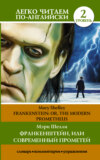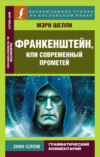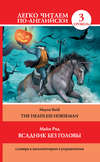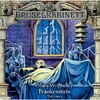Kitabı oku: «Франкенштейн / Frankenstein»
Составление, комментарии: Андрей Крюк
© Подготовка. Харвест, 2006
Letter 1
To Mrs. Saville, England
St. Petersburgh, Dec. 11th, 17—
You will rejoice to hear that no disaster has accompanied the commencement of an enterprise which you have regarded with such evil forebodings. I arrived here yesterday, and my first task is to assure my dear sister of my welfare and increasing confidence in the success of my undertaking.
R.Walton was already in St.Petersburgh. Dreams about his undertaking, about hardships and trials he may encounter with on the way to his goal, discoveries he may make during his voyage have absorbed him. He was full of determination and enthusiasm and was sure in the success of his plans. This expedition has been the favourite dream of his early years. In childhood he read with ardour the accounts of the various voyages which have been made in the prospect of arriving at the North Pacific Ocean through the seas which surround the pole. These volumes were his study day and night, and his familiarity with them increased that regret which he had felt on learning that his father’s dying injunction had forbidden his uncle to allow Robert to embark in a seafaring life. But at the time he inherited the fortune of his cousin his thoughts were turned into the channel of their earlier bent.
This is the most favourable period for travelling in Russia. They fly quickly over the snow in their sledges; the motion is pleasant, and, in my opinion, far more agreeable than that of an English stagecoach. The cold is not excessive, if you are wrapped in furs—a dress which I have already adopted, for there is a great difference between walking the deck and remaining seated motionless for hours, when no exercise prevents the blood from actually freezing in your veins. I have no ambition to lose my life on the post-road between St. Petersburgh and Archangel. I shall depart for the latter town in a fortnight or three weeks; and my intention is to hire a ship there, which can easily be done by paying the insurance for the owner, and to engage as many sailors as I think necessary among those who are accustomed to the whale-fishing. I do not intend to sail until the month of June; and when shall I return? Ah, dear sister, how can I answer this question? If I succeed, many, many months, perhaps years, will pass before you and I may meet. If I fail, you will see me again soon, or never. Farewell, my dear, excellent Margaret. Heaven shower down blessings on you, and save me, that I may again and again testify my gratitude for all your love and kindness.
Your affectionate brother, R. Walton
Letter 2
To Mrs. Saville, England
Archangel, 28th March, 17—
How slowly the time passes here, encompassed1 as I am by frost and snow! Yet a second step is taken towards my enterprise. I have hired a vessel and am occupied in collecting my sailors; those whom I have already engaged appear to be men on whom I can depend and are certainly possessed of dauntless courage.
Though Robert was busy preparing his voyage he felt extremely lonely. He had no friend, none near him who could participate his joy or sustain him in depression, a person gentle and courageous, intelligent and well educated, somebody with the tastes like his own to approve or amend his plans, to give advice in a difficult situation. Certainly he would find no friend on the wide ocean, nor even here in Archangel, among merchants and seamen but Robert met several people whose character and moral values seemed remarkable to him.
My lieutenant, for instance, is a man of wonderful courage and enterprise; he is madly desirous of glory, or rather, to word my phrase more characteristically, of advancement in his profession. He is an Englishman, and in the midst of national and professional prejudices, unsoftened by cultivation, retains some of the noblest endowments of humanity. I first became acquainted with him on board a whale vessel; finding that he was unemployed in this city, I easily engaged him to assist in my enterprise. The master is a person of an excellent disposition and is remarkable in the ship for his gentleness and the mildness of his discipline. This circumstance, added to his well-known integrity and dauntless courage, made me very desirous to engage him. A youth passed in solitude, my best years spent under your gentle and feminine fosterage, has so refined the groundwork of my character that I cannot overcome an intense distaste to the usual brutality exercised on board ship: I have never believed it to be necessary, and when I heard of a mariner equally noted for his kindliness of heart and the respect and obedience paid to him by his crew, I felt myself peculiarly fortunate in being able to secure his services. I heard of him first in rather a romantic manner, from a lady who owes to him the happiness of her life. This, briefly, is his story. Some years ago he loved a young Russian lady of moderate fortune, and having amassed2 a considerable sum in prize-money, the father of the girl consented to the match. He saw his mistress once before the destined ceremony; but she was bathed in tears, and throwing herself at his feet, entreated him to spare her, confessing at the same time that she loved another, but that he was poor, and that her father would never consent to the union. My generous friend reassured the suppliant, and on being informed of the name of her lover, instantly abandoned his pursuit. He had already bought a farm with his money, on which he had designed to pass the remainder of his life; but he bestowed the whole on his rival, together with the remains of his prize-money to purchase stock, and then himself solicited the young woman’s father to consent to her marriage with her lover. But the old man decidedly refused, thinking himself bound in honour to my friend, who, when he found the father inexorable, quitted his country, nor returned until he heard that his former mistress was married according to her inclinations. “What a noble fellow!” you will exclaim. He is so; but then he is wholly uneducated: he is as silent as a Turk, and a kind of ignorant carelessness attends him, which, while it renders his conduct the more astonishing, detracts from the interest and sympathy which otherwise he would command.
Continue for the present to write to me by every opportunity: I may receive your letters on some occasions when I need them most to support my spirits. I love you very tenderly. Remember me with affection, should you never hear from me again.
Your affectionate brother, Robert Walton
Letter 3
To Mrs. Saville, England
July 7th, 17—
My dear Sister,
I write a few lines in haste to say that I am safe—and well advanced on my voyage. This letter will reach England by a merchantman now on its homeward voyage from Archangel; more fortunate than I, who may not see my native land, perhaps, for many years. I am, however, in good spirits: my men are bold and apparently firm of purpose, nor do the floating sheets of ice that continually pass us, indicating the dangers of the region towards which we are advancing, appear to dismay them. We have already reached a very high latitude; but it is the height of summer, and although not so warm as in England, the southern gales, which blow us speedily towards those shores which I so ardently desire to attain, breathe a degree of renovating warmth which I had not expected.
No incidents have happened to Robert and his men during that time except one or two stiff gales and springing of a leak. He was in a good mood and full of confidence that success will crown his endeavours.
My swelling heart involuntarily pours itself out thus. But I must finish. Heaven bless my beloved sister!
R.W.
Letter 4
To Mrs. Saville, England
August 5th, 17—
So strange an accident has happened to us that I cannot forbear recording it, although it is very probable that you will see me before these papers can come into your possession.
Last Monday (July 31st) we were nearly surrounded by ice, which closed in the ship on all sides, scarcely leaving her the sea-room in which she floated. Our situation was somewhat dangerous, especially as we were compassed round3 by a very thick fog. We accordingly lay to, hoping that some change would take place in the atmosphere and weather.
About two o’clock the mist cleared away we saw vast plains of ice, which seemed to have no end. Suddenly they noticed a low carriage, fixed on a sledge and drawn by dogs, passing on towards the north, at the distance of half a mile. A being which had the shape of a man, but apparently of gigantic stature4, sat in the sledge and guided the dogs. They watched the traveller with our telescopes until he disappeared. Robert and his men were very excited by this encounter as they had thought they were hundred miles from any land. About two hours after this occurrence they heard the ground sea, and before night the ice broke and freed our ship.
In the morning, however, as soon as it was light, I went upon deck and found all the sailors busy on one side of the vessel, apparently talking to someone in the sea. It was, in fact, a sledge, like that we had seen before, which had drifted towards us in the night on a large fragment of ice. Only one dog remained alive; but there was a human being within it whom the sailors were persuading to enter the vessel. He was not, as the other traveller seemed to be, a savage inhabitant of some undiscovered island, but a European. When I appeared on deck the master said, “Here is our captain, and he will not allow you to perish on the open sea.”
On perceiving me, the stranger addressed me in English, although with a foreign accent. “Before I come on board your vessel,” said he, “will you have the kindness to inform me whither you are bound?”
Having heard the answer that they had been on a voyage of discovery towards the northern pole the stranger seemed to be satisfied and consented to come on board. He was in a wretched condition. He was rubbed with brandy and forced to swallow a small quantity. Than he was wrapped up in blankets and placed near the kitchen stove. After two days he was able to speak and Robert removed him to his own cabin.
When my guest was a little recovered I had great trouble to keep off the men, who wished to ask him a thousand questions; but I would not allow him to be tormented by their idle curiosity, in a state of body and mind whose restoration evidently depended upon entire repose. Once, however, the lieutenant asked why he had come so far upon the ice in so strange a vehicle.
His countenance instantly assumed an aspect of the deepest gloom, and he replied, “To seek one who fled from me.”
“And did the man whom you pursued travel in the same fashion?”
“Yes.”
“Then I fancy we have seen him, for the day before we picked you up we saw some dogs drawing a sledge, with a man in it, across the ice.”
This aroused the stranger’s attention, and he asked a multitude of questions concerning the route which the demon, as he called him, had pursued. Soon after, when he was alone with me, he said, “I have, doubtless, excited your curiosity, as well as that of these good people; but you are too considerate to make inquiries.”
“Certainly; it would indeed be very impertinent and inhuman in me to trouble you with any inquisitiveness of mine.”
“And yet you rescued me from a strange and perilous situation; you have benevolently restored me to life.”
Soon after this he inquired if I thought that the breaking up of the ice had destroyed the other sledge. I replied that I could not answer with any degree of certainty, for the ice had not broken until near midnight, and the traveller might have arrived at a place of safety before that time; but of this I could not judge. From this time a new spirit of life animated the decaying frame of the stranger. He manifested the greatest eagerness to be upon deck to watch for the sledge which had before appeared; but I have persuaded him to remain in the cabin, for he is far too weak to sustain the rawness of the atmosphere. I have promised that someone should watch for him and give him instant notice if any new object should appear in sight.
The stranger has gradually improved in health but is very silent. His manners were so gentle that all sailors were interested in him. What for Robert, he began to love him as a brother and treated him with sympathy and compassion.
I shall continue my journal concerning the stranger at intervals, should I have any fresh incidents to record.
August 13th, 17—
Days passed and Robert’s affection towards his guest grew more and more. The stranger was much recovered and often stood on the deck watching for the sledge that preceded his own. Besides this he expressed an interest in the projects of others. Robert told him honestly about his plans. As Robert spoke, a dark gloom spread over his listener’s face. At first he perceived that the stranger tried to suppress his emotion. He placed his hands before his eyes and a few seconds later Robert noticed tears trickle fast from between his fingers. Than he said in broken voice: “Unhappy man! Do you share my madness? Hear me; let me reveal my tale, and you will dash the cup from your lips!”
Such words, you may imagine, strongly excited my curiosity; but the paroxysm of grief that had seized the stranger overcame his weakened powers, and many hours of repose and tranquil conversation were necessary to restore his composure. Having conquered the violence of his feelings, he appeared to despise himself for being the slave of passion; and quelling5 the dark tyranny of despair, he led me again to converse concerning myself personally. He asked me the history of my earlier years. The tale was quickly told, but it awakened various trains of reflection. I spoke of my desire of finding a friend, of my thirst for a more intimate sympathy with a fellow mind than had ever fallen to my lot, and expressed my conviction that a man could boast of little happiness who did not enjoy this blessing. “I agree with you,” replied the stranger; “we are unfashioned creatures, but half made up, if one wiser, better, dearer than ourselves—such a friend ought to be—do not lend his aid to perfectionate our weak and faulty natures. I once had a friend, the most noble of human creatures, and am entitled, therefore, to judge respecting friendship. You have hope, and the world before you, and have no cause for despair. But I—I have lost everything and cannot begin life anew.”
As he said this his countenance became expressive of a calm, settled grief that touched me to the heart. But he was silent and presently retired to his cabin.
August 19, 17—
Yesterday the stranger said to me, “You may easily perceive, Captain Walton, that I have suffered great and unparalleled misfortunes. I had determined at one time that the memory of these evils should die with me, but you have won me to alter my determination. You seek for knowledge and wisdom, as I once did; and I ardently hope that the gratification of your wishes may not be a serpent to sting you, as mine has been. I do not know that the relation of my disasters will be useful to you; yet, when I reflect that you are pursuing the same course, exposing yourself to the same dangers which have rendered me what I am, I imagine that you may deduce an apt moral from my tale, one that may direct you if you succeed in your undertaking and console you in case of failure. Prepare to hear of occurrences which are usually deemed marvellous. Were we among the tamer scenes of nature I might fear to encounter your unbelief, perhaps your ridicule; but many things will appear possible in these wild and mysterious regions which would provoke the laughter of those unacquainted with the ever-varied powers of nature; nor can I doubt but that my tale conveys in its series internal evidence of the truth of the events of which it is composed.”
Robert was impatient to hear his history partly from curiosity and partly from a strong desire to ameliorate his fate.
“I thank you,” he replied, “for your sympathy, but it is useless; my fate is nearly fulfilled. I wait but for one event, and then I shall repose in peace. I understand your feeling,” continued he, perceiving that I wished to interrupt him; “but you are mistaken, my friend, if thus you will allow me to name you; nothing can alter my destiny; listen to my history, and you will perceive how irrevocably it is determined.”
The stranger promised to start his story the next day. Robert decided to record it as close as possible to the stranger’s words. He was sure that the story would be interesting to his sister and that he would read it with pleasure himself in some future days.
Chapter 1
I am by birth a Genevese, and my family is one of the most distinguished of that republic. My ancestors had been for many years counsellors and syndics, and my father had filled several public situations with honour and reputation. He was respected by all who knew him for his integrity and indefatigable attention to public business. He passed his younger days perpetually occupied by the affairs of his country; a variety of circumstances had prevented his marrying early, nor was it until the decline of life that he became a husband and the father of a family.
As the circumstances of his marriage illustrate his character, I cannot refrain from relating them. One of his most intimate friends was a merchant who, from a flourishing state, fell, through numerous mischances, into poverty. This man, whose name was Beaufort, was of a proud and unbending disposition and could not bear to live in poverty and oblivion in the same country where he had formerly been distinguished for his rank and magnificence. Having paid his debts, therefore, in the most honourable manner, he retreated with his daughter to the town of Lucerne, where he lived unknown and in wretchedness. My father loved Beaufort with the truest friendship and was deeply grieved by his retreat in these unfortunate circumstances. He bitterly deplored the false pride which led his friend to a conduct so little worthy of the affection that united them. He lost no time in endeavouring to seek him out, with the hope of persuading him to begin the world again through his credit and assistance. Beaufort had taken effectual measures to conceal himself, and it was ten months before my father discovered his abode6. Overjoyed at this discovery, he hastened to the house, which was situated in a mean street near the Reuss. But when he entered, misery and despair alone welcomed him. Beaufort had saved but a very small sum of money from the wreck of his fortunes, but it was sufficient to provide him with sustenan for some months, and in the meantime he hoped to procure some respectable employment in a merchant’s house. The interval was, consequently, spent in inaction; his grief only became more deep and rankling when he had leisure for reflection, and at length it took so fast hold of his mind that at the end of three months he lay on a bed of sickness, incapable of any exertion.
His daughter attended him with the greatest tenderness, but she saw with despair that their little fund was rapidly decreasing and that there was no other prospect of support. Caroline Beaufort procured plain work; she plaited straw and by various means contrived to earn a pittance scarcely sufficient to support life.
Several months passed in this manner. Her father grew worse; her time was more entirely occupied in attending him; her means of subsistence decreased; and in the tenth month her father died in her arms, leaving her an orphan and a beggar. This last blow overcame her, and she knelt by Beaufort’s coffin weeping bitterly, when my father entered the chamber. He came like a protecting spirit to the poor girl, who committed herself to his care; and after the interment7 of his friend he conducted her to Geneva and placed her under the protection of a relation. Two years after this event Caroline became his wife.
There were a considerable difference between the ages of his parents but this circumstance seemed to unite them only closer. The father loved dearly his wife and showed gratitude and worship in his attitude which inspired by respect to her virtues. Little by little his father relinquished all his public functions and after the marriage they decided to move to Italy.
It was in Italy where Victor was born. His loving parents did everything to bring him up to good. His mother had much desired to have a daughter but for a long time he was their only child. Once, while making an excursion beyond the frontiers of Italy a poor hut in the foldings of a vale attracted their attention.They saw a peasant and his wife working hard near the hut and five half-clothed children. Among the children there was a girl who attracted his mother’s attention. She was thin and very beautiful and didn’t look like the others. The peasant woman told them her history. She was a daughter of a Milanese nobleman. Her mother was a German and had died on giving her birth. Her Italian father strived for the liberty of his country. Whether he had died or still was in the dungeons8 of Austria was not known. His property was confiscated and infant was placed with these good people to nurse: they were better off then.
When Victor’s father returned home from Milan he found a nice girl playing with his son. The apparition was soon explained. With the permission of the father Victor’s mother convinced the peasants to yield their charge to her and Elizabeth stayed in their house.
Everyone loved Elizabeth. The passionate and almost reverential attachment with which all regarded her became, while I shared it, my pride and my delight. On the evening previous to her being brought to my home, my mother had said playfully, “I have a pretty present for my Victor—tomorrow he shall have it.” And when, on the morrow, she presented Elizabeth to me as her promised gift, I, with childish seriousness, interpreted her words literally and looked upon Elizabeth as mine—mine to protect, love, and cherish. All praises bestowed on her I received as made to a possession of my own. We called each other familiarly by the name of cousin. No word, no expression could body forth the kind of relation in which she stood to me—my more than sister, since till death she was to be mine only.






















